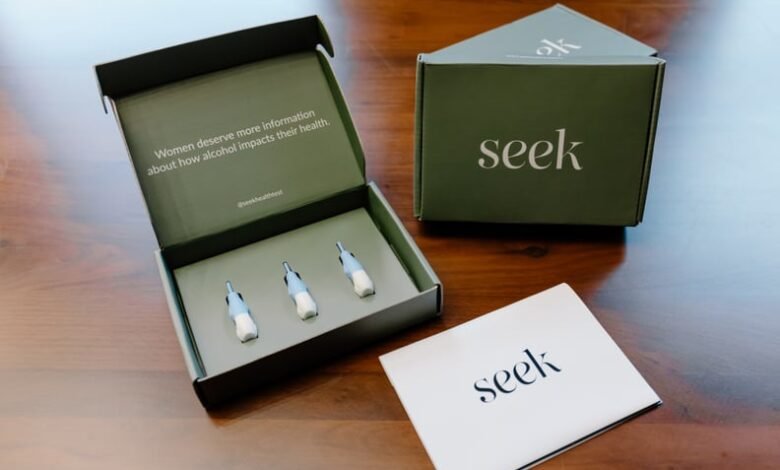I Took a Test to See How Alcohol Is Impacting My Health — Here’s How It Went

[ad_1]
:upscale()/2024/11/07/897/n/49351082/tmp_vpp1Ku_b8a2633c371c995a_Seek_Product_Shot_3_1_.jpg)
As a health editor, I’d say I’m pretty mindful about how much alcohol I consume. While a spicy marg hates to see me coming, I typically reserve drinking for social settings with friends — usually at dinner or during a birthday celebration. Lately, though, I’ve found myself swapping in a mocktail more often because, let’s be honest, as I’ve gotten older I’ve found that I don’t bounce back like I used to. There also seems to be less pressure to drink in the first place, as lifestyle trends like the sober curious movement continue to gain steam. In fact, research from market performance analytics company NCSolutions shows that 41 percent of Americans planned to drink less alcohol in 2024.
On the less comforting end of things, recent research published in The American Journal of Gastroenterology shows that women in particular are engaging in more excessive drinking and could account for close to half of alcohol-associated liver disease costs in the US by 2040 (as of 2022, they made up 29% of those costs) .
That said, it’s one thing to logically understand the mental and physical risks associated with alcohol — the impacts that go beyond a hangover, such as the increased risk of alcohol use disorder, high blood pressure, and even breast cancer — and another to really understand how your individual alcohol use is affecting your health. So when I heard about the Seek Signature Alcohol Health Test ($134), which is designed to help women assess how alcohol is impacting their health, my ears perked up. I thought it’d be interesting to take a look at my own drinking habits and the ways in which they’ve impacted my well-being. Would the information encourage me to cut back even more — or would it reassure me that I was doing pretty well at moderating on my own?
To find out, I decided to put Seek to the test. Here’s what I liked about the process and learned about my body.
How Seek Works
You’ll start by ordering Seek’s Signature Alcohol Health Test online. When it arrives, you’ll create a profile and register your test kit. The test itself involves a finger-prick blood sample collection and takes about 10 minutes. In order to meet the sample requirements, I had to squeeze my pricked finger until the drops of blood filled up the minimum measurement level line on the collection card. That card then gets sent to the labs for analysis, and your results will be added to your online profile about a week or so after you send it in.
Seek uses your sample to measure seven different biomarkers, each of which can give information about how alcohol may be affecting your body: total cholesterol, triglycerides, estradiol, aspartate aminotransferase, vitamin D, cortisol, and homocysteine. I wasn’t familiar with half of these biomarkers before taking the test, but Seek explains each one and its relationship to alcohol, while noting where your levels stand. For instance, even moderate levels of drinking can elevate estradiol levels, and high estradiol levels have been linked to an increased risk of ovarian and some types of breast cancer, per the Oxford University Press Journal of the Endocrine Society.
:upscale()/2024/11/07/924/n/49351082/tmp_8CGpMt_8749163f97bb5083_Screen_Shot_2024-10-08_at_11.05.32_AM.png)
The other section of your profile delivers suggested drinking and lifestyle modifications based on your results, broken up into categories including gut microbiome as well as brain, heart, sleep, skin, and liver health. Additional categories, like breast cancer, fertility, and menopause, can be unlocked with additional panel tests.
My Seek Results and Plan
My results were pretty normal across the board, except in three categories: vitamin D, homocysteine (HCY, an amino acid used to measure vitamin B deficiencies and other roots of inflammation), and aspartate aminotransferase (AST, an enzyme and marker of how alcohol impacts liver health).
My vitamin D and HCY levels were both low. According to Seek, drinking is one of the most common causes of low vitamin D; that said, a 2017 review concluded that more research is needed to determine how much alcohol consumption affects D levels. Seek also states that alcohol can elevate HCY levels, leading to brain fog, anxiety, and trouble sleeping, plus an increased risk of developing neurological conditions later in life.
On the other hand, Seek’s test found that my AST was high — I was at 93 units per liter (U/L), while the normal range is less than 40 U/L. According to Seek, “AST levels can elevate if a woman consumes 2+ drinks daily or 14+ drinks weekly.” I don’t consume that much alcohol, so my number was a little startling.
With this feedback, I moved to the “my plan” tab to see what suggestions Seek had for me.
The plan itself is broken up into categories and, once expanded, various biomarkers that correlate to/impact that category. For example, when I clicked on gut microbiome, there were four relevant biomarkers listed: cortisol, homocysteine, total cholesterol, and vitamin D. From the results snapshots page, I knew I was low in homocysteine and Vitamin D, so I focused on those recommendations.
Seek provided both lifestyle and drinking modifications. My lifestyle recs: incorporate more foods rich in methionine — an essential amino acid that converts to HCY — into my diet, such as chicken, tuna, salmon, and seeds. As for drinking modifications: it suggested that I consider alternating alcoholic drinks with beverages containing mushrooms, which are rich in vitamin D.
Because my AST level was high, I also checked out the recommended plan for my liver. I was told to add more ginger, turmeric, and dark berries into my diet, as these foods work as “medicinal powerhouses” to lower elevated AST levels. Seek also suggested that I consider l-carnitine supplements to help convert fat to energy.
:upscale()/2024/11/07/924/n/49351082/tmp_sYoBJm_8bdbc85f0f8b7926_Screen_Shot_2024-10-08_at_12.59.04_PM.png)
What I Like About Seek
The self-test was relatively easy to use: all it took was a simple poke of the finger to squeeze blood onto the collection card. That said, the collection card does require quite a bit of blood — more than I felt like I could squeeze out of one finger. So you may have to use two fingers — I did.
Another aspect that I like about Seek is how your profile is set up: results and a plan. Results are meant to be a snapshot of your biomarkers and levels. This was easy to digest, and you can download the page as lab results to discuss with your provider. The plan section of your profile is more overwhelming. This is where you can dive deeper into the results and how they impact aspects of your health, from your brain to your gut microbiome. You’ll also find actionable insights here, something not all at-home preventative tests offer. I loved this.
I also appreciated that you’re not left to your own devices as far as taking action. Seek offers community-based health workshops, mindful mixology classes, and workouts. The result is a sort of one-stop shop for improving your drinking habits and health.
What’s Worth Noting About Seek
TBH, once your results come in, Seek provides a lot of information, and it can be overwhelming. At first glance, I wasn’t sure how to digest all the suggestions in my plan. It definitely required a few profile visits to process everything. I even hopped on a call with Laura Korin, MD, MPH, Seek’s chief women’s health officer, to break down some of the biomarkers and my results even further. While everyone won’t have that opportunity, Seek is planning to debut a health coach add-on, says Katie Garry, CEO and founder of Seek. It’s in the beta stages, but Garry describes the sessions as as “a one-on-one meeting to focus on whatever really draws you in [from the test],” whether that’s the gut microbiome or menopause and fertility. Seek also encourages you to share your results with your doctor or healthcare provider for more support.
Another thing to keep in mind: your body is always changing and the biomarker measurements aren’t the end all, be all. Take my high AST levels, for example. Dr. Korin explains that several things could impact that number (not just alcohol intake), from cholesterol to carb load. It’s completely reasonable to assume these numbers are temporary, she says. Seek results are best optimized when you test more than once, ideally modifying your lifestyle and drinking habits in between to track your improvement, Garry says.
That said, above or below average numbers can be startling — a serious risk of home health tests like this one. I had blood work done with my primary care physician a few months later and found that my AST levels were normal again. But I was naturally more anxious about my alcohol consumption in the months awaiting my PCP visit. That’s not necessarily a bad thing, but it’s important to note that not all results are cause for concern. Instead, they can serve as jumping-off point to see where improvements can be made or what to bring up with your own provider.
Finally, keep in mind that Seek’s Alcohol Health Test isn’t a diagnostic test, and it’s not approved by the FDA. It can give you a snapshot of certain biomarkers and make some extrapolations about what they mean about your well-being and possible lifestyle modifications that you may want to experiment with, but it isn’t intended to diagnose you with any specific conditions — so, as with many at-home health tests, it’s important to understand the limitations of the information it provides.
The Bottom Line: Is Seek Worth It?
The cost is steep, but potentially worthwhile for people who are particularly interested in learning more about how alcohol impacts their health. Seek’s at-home test can easily track key biomarkers over time, without the need for invasive blood tests. The results are also very thorough and the personalized plan is impressive, offering actionable insights that other home tests do not. Seek is a great option for those looking to make a change in their drinking habits, but aren’t sure where to start.
Alexis Jones (she/her) is the senior health and fitness editor at PS. In her six years of editorial experience, Alexis has developed passions and areas of expertise around mental health, women’s health and fitness, racial and ethnic disparities in healthcare, and chronic conditions. Prior to joining PS, she was the senior editor at Health magazine. Her other bylines can be found at Women’s Health, Prevention, Marie Claire, and more.
:quality(70):extract_cover():upscale():fill(ffffff)/2024/11/19/722/n/49351082/b2be5f0a673cbae6bb2072.48020821_Seek.jpeg)




